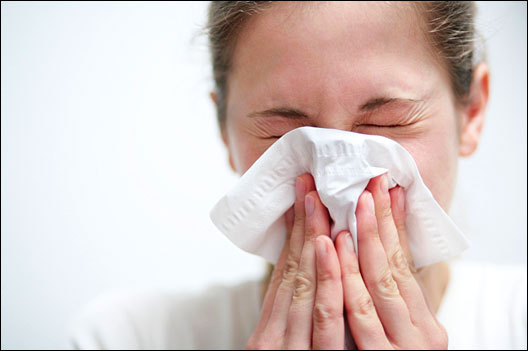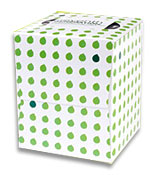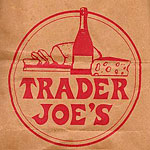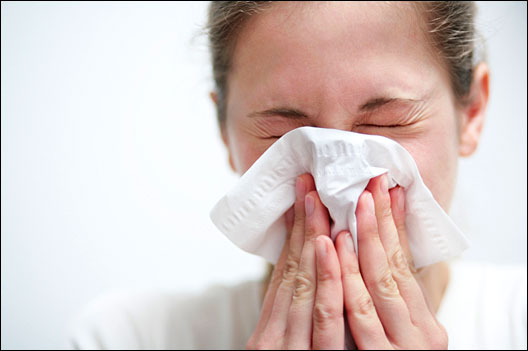
You may not be surprised to hear that U.S. paper consumption is the highest in the world, eating up some 12,430 square miles of forest each year — most of it in ecologically important areas. But did you know that pulp and paper manufacturing is one of the most polluting industries in North America and the third greatest emitter of CO2? Talk about a blow to the planet.
As any sensitive nose knows, the quest for facial tissues that are gentle on you — and the earth — is nothing to sneeze at. Is it possible to find a strong, soft schnoz-swiper that doesn’t strip the forest?
First, a suggestion (and we don’t mean to sound snotty): It should be plain as the nose on your face that the answer is a hankie. That’s right, the reusable, foldable square of cloth your grandpappy has carried around for decades. It may need a good washing every now and then, but you won’t be producing a mountain of trash every time you have a cold.
Grist’s Pick
A reusable cloth hankie
If you’ve absolutely got a hankering for a paper-based blower, look for products made with recycled content — especially post-consumer content. Many facial tissues are bleached to make them white and purdy, but as with many beauty products, this process involves the use of harmful chemicals that you really don’t want ending up in your air or water — let alone rubbed on your face. So look for products labeled totally chlorine-free (TCF) or processed chlorine-free (PCF). Here’s a handy wallet-sized guide [PDF].
After nosing around for recycled tissue options, I found offerings from Marcal, Seventh Generation, Whole Foods, Trader Joe’s, and Kleenex. Below, I assess each for its strength and softness — and whether it’ll require you to, ahem, pay through the nose.

Marcal Fluff Out
Eco-claims: 100 percent total recycled content, 30 percent minimum post-consumer content, made without chlorine bleach, packaged in recycled paperboard
Price: $1.13/100 2-ply tissues
Although they have a fun name, the Fluff Out tissues lack both strength and softness. Before getting fully out of the (bland, beige) box, the 2-ply tissues tend to separate into individual, almost see-through 1-ply sheets that fall apart at the slightest tug and do little to contain a runny nose.
Marcal has just launched a new green product line called Small Steps, which includes a 100 percent recycled facial tissue. It’s just starting to appear in stores in the Northeast.

Seventh Generation
Eco-claims: 100 percent recycled paper, 80 percent minimum post-consumer, hypo-allergenic, whitened without chlorine bleach, unscented/no dyes, box made from 100 percent recycled paper (35 percent minimum post-consumer)
Price: $2.29/85 2-ply tissues
These tissues are definitely stronger than Marcal’s Fluff Out offering. They also have a slightly smoother texture, but are prone to separate into their thin 1-ply counterparts. The boxes come in colorful, modern designs, but at 2.7 cents per tissue, they are the most expensive of the bunch.

Whole Foods Market’s 365 Everyday Value
Eco-claims: 100 percent recycled paper, 80 percent post-consumer content, whitened without chlorine bleach, hypo-allergenic, fragrance free, “virtually no lint”
Price: $1.49/80 2-ply tissues
The 365 Everyday Value box has a bright flowery image, but inside, the ripped edges on these 2-ply tissues do not bode well for the nose in need. Aside from the “unfinished” look, they foreshadow the tissue’s weakness for ripping to pieces. Add to that the harsh roughness, and the attractive box does little to keep a nose from running … far, far away.

Trader Joe’s Pocket Pack
Eco-claims: 100 percent recycled paper, 25 percent minimum post-consumer content, recycled without chlorine bleach
Price: $1.29/100 3-ply tissues
Trader Joe’s offers the only 3-ply recycled tissue I found, and it is held together with a decorative perforation pattern along all four sides. It’d look just like a fancy paper napkin if it weren’t for the small size. But the fanciness has a function — and performs it well, keeping the tissues strong and a bit softer. The unfortunate bit about these guys is that they come packaged in plastic wrapping in 10-tissue pocket packs. Useful for purse-carrying, but no good waste-wise.

Kleenex Naturals
Eco-claims: 20 percent recycled fiber that is 100 percent post-consumer content, box made from 100 percent recycled paper
Price: $3.19/184 2-ply tissues
Kleenex brand tissues are made by the Kimberly-Clark company, enemy No. 1 of Greenpeace’s Kleercut campaign to save ancient forests. And it’s quite possible that 80 percent of these tissues’ content came from old-growth woods — but because they contain 20 percent recycled fiber (all of which is post-consumer), I included them as a comparison.
The company calls this fiber “SoftBlend,” and it does seem to be softer than the other tissues — although not as luxuriously soft as some Kleenex tissues. Despite being only 2-ply, they also seemed to be the strongest of the bunch, even when wet. Like the Trader Joe’s brand, the layers in these are held together fairly well. All in all, a pleasant tissue experience, though their origin makes me want to cry into them.
The Bottom Line: Your best bet all around is a cloth handkerchief. It will be cheaper over time, softer, and much stronger than anything tested here. The fact that it’s reusable means it doesn’t get tossed, and all of the harmful production-related stuff (manufacturing, packaging, transporting) happens only once, rather than every time you have a good cry.



